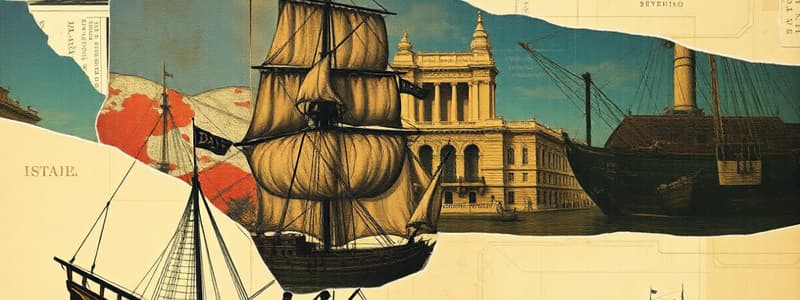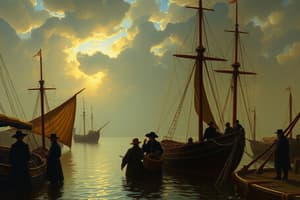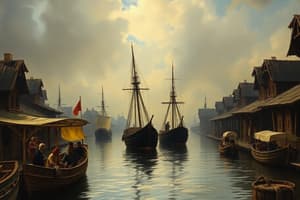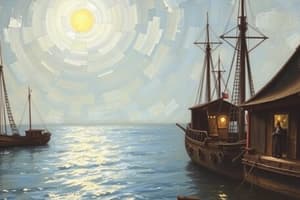Podcast
Questions and Answers
What was the Age of Discoveries?
What was the Age of Discoveries?
A pivotal period from the 15th to the 17th centuries marked by European explorations that led to the discovery of new lands.
Which century did the Commercial Revolution primarily take place?
Which century did the Commercial Revolution primarily take place?
- 11th to 18th century (correct)
- 15th to 17th century
- 14th to 17th century
- 16th to 19th century
Who led the first expedition to circumnavigate the globe?
Who led the first expedition to circumnavigate the globe?
- Hernán Cortés
- Christopher Columbus
- Vasco de Gama
- Ferdinand Magellan (correct)
The Commercial Revolution was marked by the rise of powerful trading ______.
The Commercial Revolution was marked by the rise of powerful trading ______.
The Age of Exploration was aimed solely at discovering new lands.
The Age of Exploration was aimed solely at discovering new lands.
Which explorer opened the Americas to European colonization?
Which explorer opened the Americas to European colonization?
What economic motivations drove the Age of Exploration?
What economic motivations drove the Age of Exploration?
Study Notes
Commercial Revolution and Age of Exploration
- Spanned from the 11th to the 18th centuries, the Commercial Revolution was a period of European economic expansion marked by colonialism and mercantilism.
- The rise of banks and financial institutions played a crucial role in the Commercial Revolution.
- Powerful trading companies like the Dutch East India Company emerged during this time.
- The introduction of new commodities and trade routes was a key driver of the Commercial Revolution.
- The Commercial Revolution resulted in increased wealth and power for European nations.
- The era laid the foundations for a global trade network, fueled further exploration and colonization.
Age of Exploration
- Took place from the 15th to the 17th centuries.
- Europeans embarked on explorations driven by seeking new trade routes, wealth, and knowledge.
- This period was shaped by the desire for economic, religious, and political gains.
Key Explorers
- Christopher Columbus is known for opening the Americas to European colonization.
- Vasco de Gama established a sea route to India.
- Ferdinand Magellan led the first expedition to circumnavigate the globe.
- Magellan was a Portuguese explorer leading a Spanish expedition.
Battle of Mactan, Magellan Expedition & Spanish Colonization
- During his circumnavigation voyage, Magellan encountered Lapu-Lapu, the chieftain of Mactan Island.
- Lapu-Lapu resisted Magellan's attempt to impose Christianity on the natives.
- The Battle of Mactan resulted in Magellan's death.
- This event marked a significant turning point in the Spanish colonization of the Philippines.
The Role of Literature
- Literature played a role in shaping and reflecting the colonial interests of the era.
- Writers used literature to document their explorations, justify colonization, and promote their worldview.
Historical Legacy of the Age of Discoveries and Colonial Integration
- The Age of Discoveries and Colonial Integration era transformed the global political, economic, and cultural landscape.
- The period saw the emergence of vast colonial empires, shaping global power dynamics and leading to a significant exchange of goods, ideas, and cultures.
- The era also had a profound impact on indigenous populations, leading to cultural changes, displacement, and subjugation.
Studying That Suits You
Use AI to generate personalized quizzes and flashcards to suit your learning preferences.
Description
Explore the transformative period of the Commercial Revolution, spanning from the 11th to the 18th centuries, which was marked by European economic expansion and colonialism. Delve into the Age of Exploration, highlighting the key motives behind the voyages and the emergence of influential trading companies. This quiz covers the rise of new trade routes, major explorers, and the foundation of global trade networks.




